

Principle (c): Data minimisation. At a glance You must ensure the personal data you are processing is: adequate – sufficient to properly fulfil your stated purpose;relevant – has a rational link to that purpose; andlimited to what is necessary – you do not hold more than you need for that purpose.
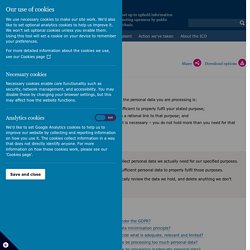
Checklist ☐ We only collect personal data we actually need for our specified purposes. ☐ We have sufficient personal data to properly fulfil those purposes. ☐ We periodically review the data we hold, and delete anything we don’t need. In brief What’s new under the GDPR? Very little. The main difference in practice is that you must be prepared to demonstrate you have appropriate data minimisation practices in line with new accountability obligations, and there are links to the new rights of erasure and rectification. What is the data minimisation principle? Article 5(1)(c) says: “1. Nurse prosecuted for inappropriately accessing patient records. A former nurse at Southport and Ormskirk Hospital NHS Trust has been prosecuted for accessing patients’ medical records without authorisation.
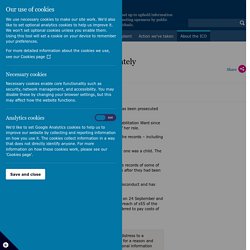
Clare Lawson who had been a staff nurse on the hospital’s Rehabilitation Ward since October 2011 had accessed patients’ medical records outside of her role. The Court heard that Ms Lawson had inappropriately accessed the records – including maternity and paediatric records - of five patients, 17 times. She also accessed a further 109 records of 18 patients of which one was a child. The activity occurred between 2014 and 2016. It was also heard that Ms Lawson made multiple accesses to the records of some of these individuals including the blood results of a friend 44 times after they had been discharged, as well as foetal scans of another patient.
She was dismissed by the Trust in September 2017 for gross misconduct and has been referred to the Nursing and Midwifery Council. ICO Director of Investigations, Steve Eckersley, said: Blood Safety and Quality Regulations 2005 (as amended) The Regulations implement the provisions of Directive 2002/98/EC and associated Directives so that the retention periods for data relating to human blood and blood components outlined in the Directive are now part of UK law.
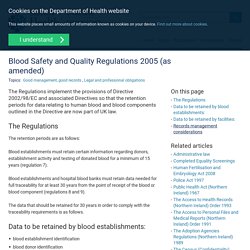
Jump to table of contents The Regulations The retention periods are as follows: Individuals’ Right under HIPAA to Access their Health Information. Newly Released FAQs on Access Guidance New Clarification – $6.50 Flat Rate Option is Not a Cap on Fees for Copies of PHI Introduction Providing individuals with easy access to their health information empowers them to be more in control of decisions regarding their health and well-being.

For example, individuals with access to their health information are better able to monitor chronic conditions, adhere to treatment plans, find and fix errors in their health records, track progress in wellness or disease management programs, and directly contribute their information to research. With the increasing use of and continued advances in health information technology, individuals have ever expanding and innovative opportunities to access their health information electronically, more quickly and easily, in real time and on demand.
General Right Information Included in the Right of Access: The “Designated Record Set” Individuals have a right to access PHI in a “designated record set.” Verification. Is my mobile app required to comply with HIPAA? - TermsFeed. HIPAA stands for the Health Insurance Portability and Accountability Act.
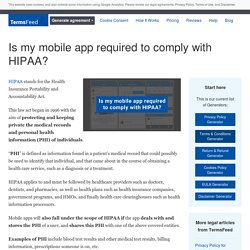
This law act began in 1996 with the aim of protecting and keeping private the medical records and personal health information (PHI) of individuals. “PHI” is defined as information found in a patient’s medical record that could possibly be used to identify that individual, and that came about in the course of obtaining a health care service, such as a diagnosis or a treatment. HIPAA applies to and must be followed by healthcare providers such as doctors, dentists, and pharmacies, as well as health plans such as health insurance companies, government programs, and HMOs, and finally health care clearinghouses such as health information processors.
Mobile apps will also fall under the scope of HIPAA if the app deals with and stores the PHI of a user, and shares this PHI with one of the above covered entities. Like the MyFitnessPal mobile app, this data is not considered PHI for purposes of the HIPAA act. Summary of "CLIA Programs and HIPAA Privacy Rule; Patients' Access to Test Reports (CMS-2319-F)" Final Rule¹ Is health-care data the new blood? - The Lancet Digital Health. Privacy - Is a Blood sample considered Personal Data under GDPR? - Law Stack Exchange. Doctor's Data. This Notice of Privacy Practices (“Notice”) describes how medical information about you may be used and disclosed and how you can get access to this information.
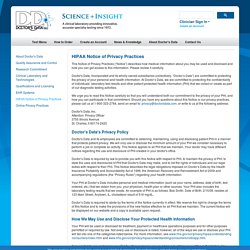
Please review it carefully. Doctor's Data, Incorporated and its wholly owned subsidiaries (collectively, “Doctor’s Data”) are committed to protecting the privacy of your personal and health information. At Doctor’s Data, we are committed to protecting the confidentiality of individuals’ laboratory test results and other patient protected health information (PHI) that we collect or create as part of our diagnostic testing activities. We urge you to read this Notice carefully so that you will understand both our commitment to the privacy of your PHI, and how you can participate in that commitment. Should you have any questions about this Notice or our privacy practices, please call us at 1-800-323-2784, send an email to: privacy@doctorsdata.com, or write to us at the following address: Doctor's Data, Inc. Our Responsibilities.
Uksi 2018 231 contents made.